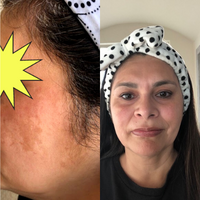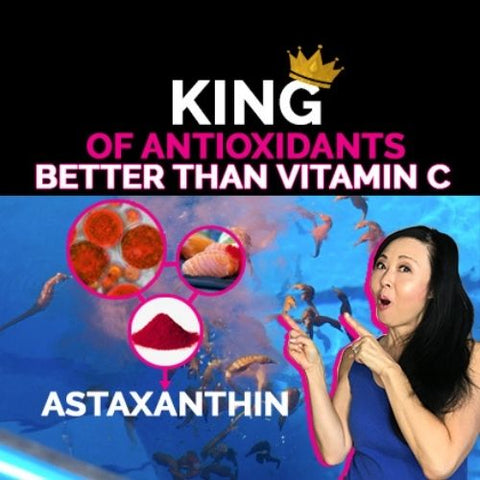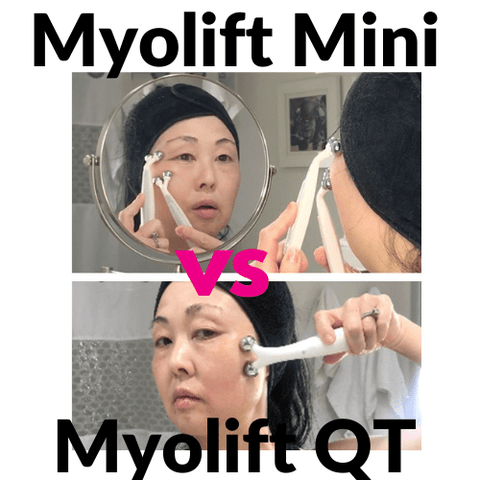Although most professionals recommend applying vitamin c serum during the day BEFORE you apply your sunscreen and BEFORE you go outside, according to several clinical studies, the actual results showed that the BEST time to apply vitamin C serum on the face is AFTER you come in from sun exposure. (sources below)
In laboratory studies, when vitamin c was applied topically, a reduction in erythema, and cell damage was measured.
For example, one study showed than when 10% vitamin C was applied topically, there was a 52% reduction in redness that was induced by UVB and 40-60% reduction in DNA and sunburn cell damage.
When the skin is exposed to UV rays, Reactive Oxygen Species (ROS) are created. These are basically free radicals that create havoc because they are unstable, unattached molecules.
How Vitamin C potentially neutralizes these free radicals is by contributing extra ions to these unattached molecules.
Free radicals cause damage to cell membranes, nucleic acids (think DNA), and proteins in our bodies. When it comes to our skin, the visible damage shows up in premature aging of the skin such as fine lines and wrinkles, sagging, uneven skin tone, and hyper pigmentation.
Apparently, the best time to apply vitamin c serum is in regular intervals.
A study was done by Japanese scientists showed that the best visible results were shown when the vitamin c serum was applied in 8 regular hourly applications. I don’t know how many people would even remember or even be willing to apply the vitamin c serum on the skin that many times a day.
Vitamin C is also extremely oxidative when exposed to heat, light and air. This can also prove to be difficult when the vitamin C serum is applied to the skin, when it has already begun to break down as soon as the skin is exposed to UV rays.
Vitamin C Serum and Sunscreen
Although studies have shown that applying vitamin C serum AFTER sun exposure helps to slow down and neutralize the damaging effects of UV exposure , it can still be fairly beneficial to apply the vitamin c serum BEFORE applying sunscreen.
However, it is important to remember that vitamin C serum and sunscreen boost the anti aging effects of the sun but in two different ways.
The sunscreen blocks about 55% of the free radicals produced by the UV rays . The sunscreen protects the skin FROM the free radicals by preventing most of the UV rays from even reaching the skin.
Vitamin C serum does NOT protect the skin from UV rays. What the vitamin C serum does that the sunscreen does NOT , is the vitamin c serum protects the skin from the free radical damage IN the skin when the skin has been exposed to UV rays.
It is important to note that studies have shown there is only a limited amount of vitamin C, that the skin is able to store. When applied regularly, it is about 4 days worth of daily use.
Best Type of Sunscreen to Use with Vitamin C
Vitamin C neutralizes inflammation. Vitamin C serum can be used in a number of different ways to help reduce inflammatory related skin diseases such as rosacea and help reduce post inflammatory hyper pigmentation.
When vitamin C is being used as a part of a skin care protocol to help with inflammation such as promoting wound healing (post treatment procedures), acne, and melasma, it is important to pair it with other skin care ingredients that help reduce inflammation.
The best type of sunscreen that pairs well with vitamin C is a zinc oxide based sunscreen. Physical sunscreen that has zinc oxide or is combined with another physical sunscreen such as Titanium Dioxide lays on TOP of the skin instead of being absorbed in the skin with chemical sunscreen. This can potentially cause low level inflammation in the skin, especially if the skin is sensitive.
If other skin care ingredients that can cause photo sensitivities such as AHA’s, BHA’s, and/or Retin A, Retinol are also being used, this may also cause more inflammation in the skin causing more pigmentation or inflammation that can lead to the break down of collagen and elastin over time.
Zinc oxide is a natural anti inflammatory agent so this pairs well with the Vitamin C.
Many darker skin tones have a difficult time with zinc oxide sunscreens because it can create a white cast over the skin. However, with experience, one can learn to use it in such a way, that it doesn’t look ashy.
Many people use vitamin C serum hoping that the vitamin C will help lighten more severe forms of pigmentation such as melasma. However, it is important to note that vitamin C is NOT a skin bleaching ingredient.
Vitamin C should be used to help with preventative measures in slowing down the aging of skin and preventing more pigmentation from forming to keep the melasma from getting larger and darker.
Vitamin C visibly evens out skin tone by assisting in regulating pigment formation and reducing overproduction of pigments in the skin.
BEST Sunscreen to Use with Melasma/Hyperpigmentation:
The best sunscreen to use with melasma and hyperpigmentation is a mineral sunscreen. Chemical sunscreens can inflame the skin.
The higher percentage the zinc oxide, the more coverage and physical barrier the sunscreen provides. The downside is that it is not sheer and can appear as a white cast when applied on the skin.
Another benefit is if the sunscreen formulations also have the added benefit that helps suppress melanin formation while the skin is being exposed to sun exposure.
It also helps if the sunscreen is formulated to be a sunscreen/moisturizer. This helps to cut down on the amount of products being applied to the skin AND avoids accidentally diluting the SPF formulation.
There are many formulations out on the market today. The one I have used specifically for my clients who have hyperpigmentation and melasma is this one.
If you have melasma and you would like to use Vitamin C, please see below:
3 Things you should know about Vitamin C
The TRUTH about Vitamin C and YOUR Skin
What’s Better than Vitamin C for skin?
Sources used:



